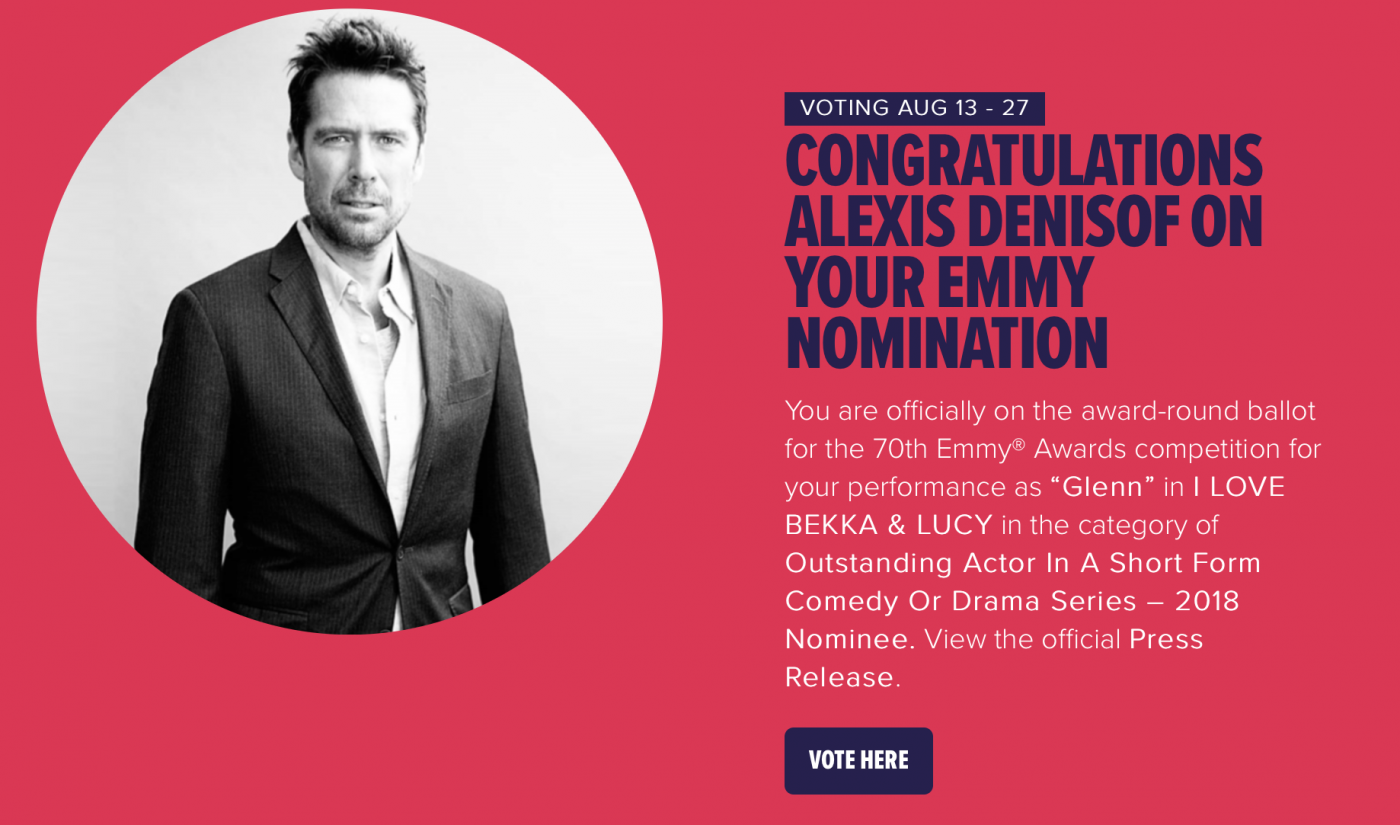Insights is a weekly series featuring entertainment industry veteran David Bloom. It represents an experiment of sorts in digital-age journalism and audience engagement with a focus on the intersection of entertainment and technology, an area that David has written about and thought about and been part of in various career incarnations for much of the past 25 years. David welcomes your thoughts, perspectives, calumnies, and kudos at david@tubefilter.com, or on Twitter @DavidBloom.
Alexis Denisof’s acting career started in the tony precincts of the London stage and the Royal Shakespeare Company, segued to American cult TV hit Buffy the Vampire Slayer, followed by a string of superhero movies and TV shows, before coming to now, with his first Emmy nomination for, of all things, an episodic digital-video comedy, Stage 13‘s I Love Bekka & Lucy.
It’s been quite a run.

Subscribe to get the latest creator news
From Shakespeare To Whedon
Denisof first made a splash in the United States when he was cast for two episodes in Buffy as Wesley Wyndham-Pryce, a character whose dramatic function was, Denisof says, as “a foil” and “irritant” to Sarah Michelle Gellar‘s titular character and other principals.
Denisof performed his role engagingly enough that the character stuck around through nine episodes of Buffy, and then became a constant part of Buffy spinoff Angel, where Denisoff appeared in another 100 episodes.
After Angel came recurring roles on TV shows How I Met Your Mother, H+, Finding Carter, Dollhouse, and Grimm, and a string of superhero projects, including The Avengers and Guardians of the Galaxy, The sharp-eyed will notice that Denisof’s work has often included projects created by Joss Whedon, from Buffy through Dollhouse.
“Clearly I have an awful lot to thank Joss and that show for,” Denisof said. “Chiefly finding my wife (Buffy and HIMYM star Alyson Hannigan) and the mother of my children.”
Moving from William (Shakespeare) to Whedon wasn’t as big a head snap as you might imagine, Denisof argues.
“There was certainly an adjustment technically,” Denisof said. “Anybody going from theater to TV will need to make adjustments and learn the technicalities of it. But in a funny way, there are a lot of similarities between Joss’s work and classic theater. (Like Shakespeare,) Joss created a language of his own. We all had to learn Shakespeare’s English. I also learned Joss’ English.”
More recently, Denisof joined the cast of I Love Bekka & Lucy, from WarnerMedia’s specialty digital production and distribution unit Stage 13. The show’s logline description is simple enough: “Best friends Bekka and Lucy live together on a blissfully secluded block. All is well until a new neighbor moves in next door and Lucy’s boyfriend unexpectedly proposes.”
But there’s a lot going on under that modest premise, thanks to creator Rachael Holder‘s writing (she also directed and produced). Bekka and Lucy (Tanisha Long and Jessica Parker Kennedy) are African-American. And Denisof’s character, Glenn, is white and confined to a wheelchair.
The Audacity Of Ordinary
As Holder said during an Emmy consideration event in June, she created the show because she wasn’t seeing a lot of stories on the screen that represented people like her, leading normal lives. In fact, it is the sheer ordinariness of Bekka and Lucy’s day-to-day lives that feels so (unfortunately) audacious in a risk-averse Hollywood that for decades seemingly couldn’t tell a story about people of color unless they’re facing emotional and personal mayhem.
“These girls are living in splendid isolation,” Denisof says of Bekka and Lucy. “They’re not looking for men, they’re not looking for anything other than what they’ve got. You’re immediately introduced to the voice of Rachael: These girls are intelligent, and funny, and honest, and truthful with each other.”
But Denisof’s character disrupts all that. Glenn has his own challenges, and not just with the results of a spinal-cord injury. The show slowly unpeels his oddball personality.
“Ultimately, it’s honest and it’s funny,” said Denisof. “Initially, this character she created was as a disruptive force, but when you get under his skin, there are so many other things in him that turn the story into something quite different.”
Even the response by the two stars the first time they see Glenn (they derisively dismiss the new, older, white, male neighbor as a lurking creep until they see his wheelchair and then scramble to be pleasant, and wonder if they should feel bad for having been mean).
“There are a lot of opportunities for characters in the show to experience their biases,” Denisof said. “There’s a lot of social change going on. What does that feel like? How do we connect through difference? I love the kindness that roots the show.”
Diversity At Stage 13
Denisof said he also loves how Stage 13 has spotlighted young talent, especially women, people of color and LGBTQ creators.
“Their slate is all over the place,” Denisof said. “They have music documentary (Independent), Two Sentence Horror Stories. Ours is a sweet, heart-warming story, about 90 minutes long, broken into episodes 10 to 12 minutes in length. It has high production values. It looks beautiful.”
The combined Bekka & Lucy episodes, with all the credit material stripped out, were the first digital show to screen at SXSW Festival’s TV section. Since then, the show has attracted a lot of online attention, and, for Denisof, his first Emmy nomination, for Outstanding Actor in a Short Form Comedy or Drama Series.
“I think this show leaves you feeling better,” Denisof said. “You leave it thinking there’s hope in the world.”
Denisof is aware of the potential for criticism because he was cast for a role in a wheelchair, which he doesn’t need in his real life.
“I thought a lot about that when I was up for the role,” he said. “Ultimately it’s about access. If the process is open and equitable and fair, that relates to everybody. We have to ensure we’re making the door open so that people of all kinds get the opportunity to win the part. After that, it’s really a creative decision.”
That said, when he did get the role, “I took it very seriously. My first task was to really honor that. I did a significant amount of research, going to rehab centers and hospitals,” talking with people living their lives in wheelchairs.
Denisof credited two organizations, Global Mobility USA and Extreme Mobility Camps, with teaching him the realities and challenges of life in a wheelchair.
Founder and President David Richard of Global Mobility even built a wheelchair for Denisof that he used in the show. More generally, Global Mobility ships badly needed wheelchairs (“by the container load,” Denisof said) to lesser-developed countries for some of their neediest citizens. Since working with the two organizations, Denisoff has championed both in public events and interviews.
Now comes the big question: what’s next for Glenn, Bekka, and Lucy?
“The cool thing about short form is that it asks, ‘Is there another version?'” Denisof said. “In our case, we’re looking at other versions of it. Does it want to go to long form? Can it sustain? Is it perfect as it is? That’s the fun and flexibility of short form. It gives you the chance to work with story, work with characters and see what the best fit is. Short form really gives you a test tube for your show. In the case of Bekka & Lucy, it’s been such a smash, the real question is what can it be? The real question is about ‘what,’ not ‘if’ there’s a Season 2.”
If you’d like to hear a podcast version of my conversation with Alexis Denisof, go to Bloom In Tech, available on Anchor.fm here, as well as iTunes, Spotify, Google, Overcast, Breaker, Pocket Casts, Radio Public, Castbox, and other locations where fine audio experiences can be enjoyed.








